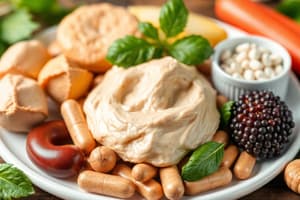Podcast
Questions and Answers
What percentage of her daily intake is protein?
What percentage of her daily intake is protein?
- 25%
- 30%
- 10%
- 20% (correct)
What issue is the new member experiencing despite her rigorous exercise regimen?
What issue is the new member experiencing despite her rigorous exercise regimen?
- Increased energy levels
- Improved body composition
- Weight gain
- Muscle loss (correct)
Which primary sources of protein is she relying on, according to the nutritional evaluation?
Which primary sources of protein is she relying on, according to the nutritional evaluation?
- Fish and seafood
- Meat and poultry
- Processed protein shakes
- Legumes, nuts, seeds, and dairy (correct)
What change in body composition was observed in the member?
What change in body composition was observed in the member?
What might be a contributing factor to her fatigue and poor recovery after workouts?
What might be a contributing factor to her fatigue and poor recovery after workouts?
Given her current dietary macronutrient distribution, what adjustments could help the new member increase her protein intake?
Given her current dietary macronutrient distribution, what adjustments could help the new member increase her protein intake?
How might the reliance on legumes, nuts, and seeds as protein sources affect the member's muscle loss?
How might the reliance on legumes, nuts, and seeds as protein sources affect the member's muscle loss?
What role does adequate protein intake play in recovery and performance for someone engaging in regular exercise?
What role does adequate protein intake play in recovery and performance for someone engaging in regular exercise?
Discuss how a high carbohydrate intake might influence the member's energy levels and muscle gains.
Discuss how a high carbohydrate intake might influence the member's energy levels and muscle gains.
In light of her symptoms, what additional dietary components might she examine for improved health outcomes?
In light of her symptoms, what additional dietary components might she examine for improved health outcomes?
Flashcards are hidden until you start studying
Study Notes
Member Profile
- New member: 45-year-old woman focused on improving physical health and body composition.
- Reports muscle loss, fatigue, and inadequate recovery despite regular exercise and a perceived healthy diet.
Exercise and Diet
- Follows a rigorous exercise regimen.
- Believes she maintains a healthy diet but faces challenges in muscle preservation and recovery.
Nutritional Investigation
- Nutrition team analyzed her dietary intake with emphasis on protein consumption.
- Current macronutrient distribution:
- 50% carbohydrates
- 20% protein
- 30% fat
- Primary sources of protein include legumes, nuts, seeds, and dairy.
Body Composition Analysis
- Results indicated a decrease in muscle mass.
- Associated with an increase in body fat percentage.
- Highlights potential inadequacies in protein intake relative to her fitness goals.
Member Profile
- New member: 45-year-old woman focused on improving physical health and body composition.
- Reports muscle loss, fatigue, and inadequate recovery despite regular exercise and a perceived healthy diet.
Exercise and Diet
- Follows a rigorous exercise regimen.
- Believes she maintains a healthy diet but faces challenges in muscle preservation and recovery.
Nutritional Investigation
- Nutrition team analyzed her dietary intake with emphasis on protein consumption.
- Current macronutrient distribution:
- 50% carbohydrates
- 20% protein
- 30% fat
- Primary sources of protein include legumes, nuts, seeds, and dairy.
Body Composition Analysis
- Results indicated a decrease in muscle mass.
- Associated with an increase in body fat percentage.
- Highlights potential inadequacies in protein intake relative to her fitness goals.
Studying That Suits You
Use AI to generate personalized quizzes and flashcards to suit your learning preferences.




